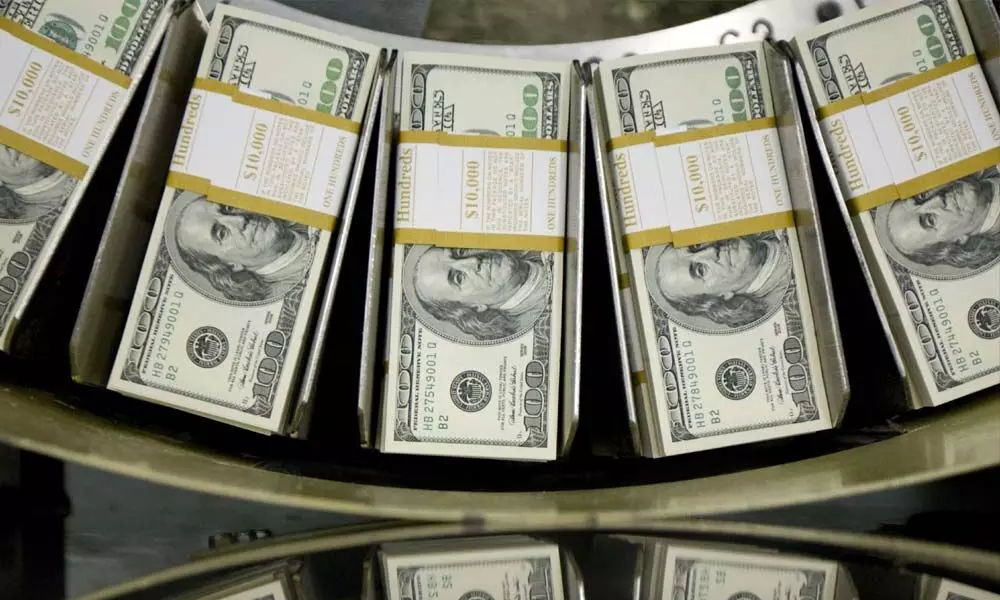Can the world survive without dollar diplomacy?
This flexing of monetary muscle raises big questions about the world’s dependence on the greenback and the moral hazard it implies. What if the US decides it no longer wishes to shoulder the responsibilities that come with being a global lender of last resort?
image for illustrative purpose

For all the allure of the America-in-decline narrative, the world has few alternatives
The Federal Reserve's rescue of the global financial system one year ago prevented a public health crisis from degenerating into market chaos. When histories of the Covid-19 pandemic are written, it would be short-sighted to ignore this exercise in financial diplomacy that cemented the dollar's role as a pillar of the world economy.
This flexing of monetary muscle raises big questions about the world's dependence on the greenback and the moral hazard it implies. What if the US decides it no longer wishes to shoulder the responsibilities that come with being a global lender of last resort? For all the allure of the America-in-decline narrative, the world has few alternatives.
In late March 2020, the Fed dramatically expanded the supply of bucks to foreign central banks. It did this by opening dollar-liquidity swap lines with nine overseas monetary authorities, including those of Singapore, South Korea, Australia and New Zealand. (The Fed had existing deals with the UK, euro zone, Japan, Canada and Switzerland.) It also established a programme that allowed more countries to temporarily exchange US Treasury notes for dollars.
Not acting would have been disastrous. The world stood on the precipice of a funding crisis, as my Bloomberg Opinion colleague Shuli Ren wrote here. The Bloomberg Dollar Spot Index soared the most since 2008. Yet the Fed's measures worked: A dollar squeeze was eventually stymied. The MSCI Emerging Markets Currency Index bottomed on March 23 and enjoyed a strong rally for most of the past year.
Seven decades after the Bretton Woods agreement, which shaped the post-World War II financial architecture, the dollar's influence has only grown. "Despite the widespread prediction that the world is evolving towards a more multipolar system, the US dollar remains by far the most important anchor currency (or in the case of more flexible arrangements, reference currency), particularly when one considers the integration of China and former Soviet bloc in the global financial system," wrote Ethan Ilzetski, Carmen Reinhart and Kenneth Rogoff in a 2019 paper.
How the US has deployed its leverage is also instructive. The principal beneficiaries were allies and partners. None of the nine additional central banks to get swaps were foes of Washington. There was a hard political reality to this. Yes, the Fed is independent in setting US monetary policy, but it is also acutely mindful of sensibilities in Congress. For an example of how internationalism can quickly go south on Capitol Hill, look no further than Treasury Secretary Janet Yellen's testimony to the Senate Banking Committee this month. She ran into fierce Republican opposition to proposals for an additional capital infusion to the International Monetary Fund. Republican Senator John Kennedy of Louisiana said the cash influx would direct money from US taxpayers to adversaries like China and Russia.
Though the Fed calibrated its actions deftly, those steps nonetheless underscore the vulnerability of the global financial system. The world may have become too dependent on the dollar and the Fed riding to the rescue. This is among the challenges identified in a January 2021 paper by Saleem Bahaj, an economist at the Bank of England, and Ricardo Reis, a professor at the London School of Economics. "Are banks investing too heavily in foreign assets or relying too much on foreign borrowing leading to macro-financial fragility, and is this fragility addressed by the swap lines?" they wrote.
The perils of addiction notwithstanding, we are stuck with dollar dominance for the foreseeable future. "What's the counter-factual?" Reis asked in a telephone interview last week. Even if China was the only major economy to show any growth at all in 2020, and its gross domestic product will likely surpass the US before the end of the decade, the yuan is miles from being the world's foreign-exchange backstop. What's more, it's not clear that a world defined by serious competition, even a cold war among reserve currencies, is necessarily a more stable one. When the system is ablaze, you don't want squabbles about what type of fire truck to drive to the scene, or doubts about whether its hoses fit the hydrant.
China has grand strategic designs, but when there's a rupture in the plumbing of the world's monetary system, who you gonna call? The much-maligned US, the power thought to be in its sunset years. (Bloomberg)

